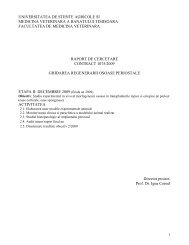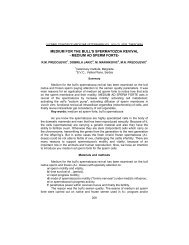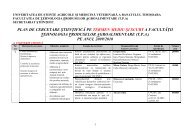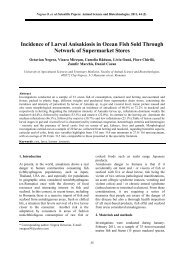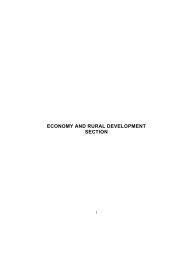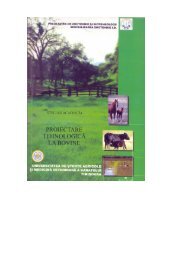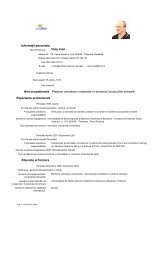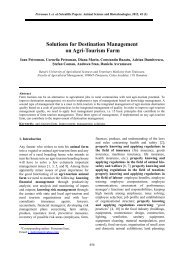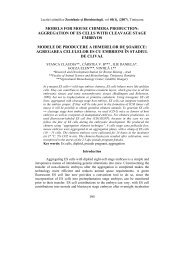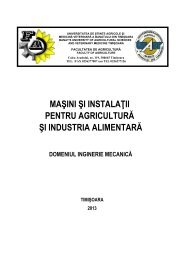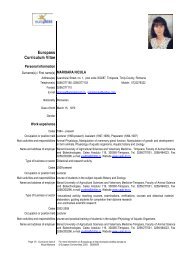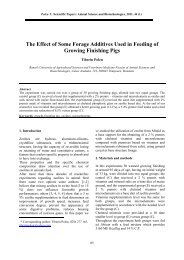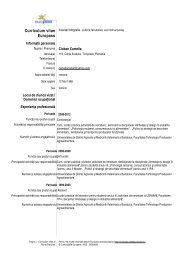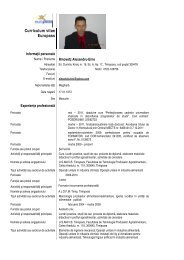journal of linguistic studies
journal of linguistic studies
journal of linguistic studies
You also want an ePaper? Increase the reach of your titles
YUMPU automatically turns print PDFs into web optimized ePapers that Google loves.
One <strong>of</strong> the reasons for this occurrence is that manuals and reference books demand<br />
more attention from authors, and part <strong>of</strong> that pr<strong>of</strong>essional attention will be dedicated to<br />
which words should be used. This is not the case with price lists where we can see copy<br />
and paste in action. Manuals, reference books and catalogues also have more neologisms<br />
which can be a good practice but we must not exaggerate since the “artificial” creation <strong>of</strong><br />
neologisms is not a desirable method, but an option.<br />
Other types <strong>of</strong> pr<strong>of</strong>essional literature contain a huge number <strong>of</strong> Anglicisms, which<br />
comes as natural, since most <strong>of</strong> the people using this sort <strong>of</strong> literature are expected to<br />
know enough about asembler and kompajler. So, while reading this type <strong>of</strong> literature a<br />
sufficient level <strong>of</strong> expertise is required and consequently most <strong>of</strong> these experts do not<br />
need translation equivalents. Additionally, most <strong>of</strong> s<strong>of</strong>tware they use is in English, so<br />
probably translation into Montenegrin would make little sense. But, on the other side, we<br />
have laymen who claim everything or most <strong>of</strong> the things should be fully translated in<br />
order for this literature to be accessible to everyone.<br />
When compared to Montenegrin, the English language exceptionally easy creates<br />
new lexical elements, or expands semantic fields to the existing words.<br />
4. CONCLUSIONS<br />
In the end, we will shortly address the situation in neighbouring countries when it<br />
comes to Anglicisms. According to some <strong>of</strong> publications, which can be found in<br />
references, numerous authors consider this period as a “flood” time <strong>of</strong> Anglicisms. What<br />
they point out as the most troublesome effect is that those Anglicisms are nonsystematically<br />
taken from English and that is causing further problems to grammatical<br />
issues and rules, thus creating chaos in some languages. It is more or less explicitly stated<br />
that media and newspapers are partially guilty for this situation, since they promote<br />
Anglicism in their texts, in order to make them more credible. To be more precise, some<br />
authors stated texts in print media contain numerous Anglicisms since Anglicisms are<br />
considered “better”, “stronger”, “fancier” words than their domestic counterparts.<br />
Whatever is correct, it is good to see that extremist purist views have lost their<br />
momentum and the topic <strong>of</strong> Anglicisms or any other “-isms” is considered purely from<br />
expert – <strong>linguistic</strong> view. This, in turn, will provide more quality to any discussion related<br />
to this topic and enable finding <strong>of</strong> long-term solutions and policies. We have more and<br />
more publications on this topic, and, one common idea behind all <strong>of</strong> them is that we<br />
cannot be passive when it comes to the future <strong>of</strong> our language. Part <strong>of</strong> Anglicisms must<br />
be adapted and the other part must be adopted as an inevitable reality <strong>of</strong> lexical evolution<br />
<strong>of</strong> our language.<br />
Moreover, it is necessary to establish competent bodies which would monitor the<br />
quality <strong>of</strong> language and react where it deems appropriate. More and more experts from<br />
different areas have to join together in order to obtain quality translations. This was more<br />
than obvious during the recent process <strong>of</strong> the EU Questionnaire translation where the<br />
European Council sent questions to our Government. Many experts from different fields<br />
were gathered together, and as a result we have quality translations which would help<br />
Montenegrin to get the place it deserves in the European language family. This is one<br />
good examp0le how Montenegrin may be put into more prominent place. This would<br />
enable our language to systematically deal with lexical borrowings.<br />
To summarise, we can say that the use <strong>of</strong> Anglicisms is very frequent in the<br />
Montenegrin language. This is mainly caused by:<br />
21



